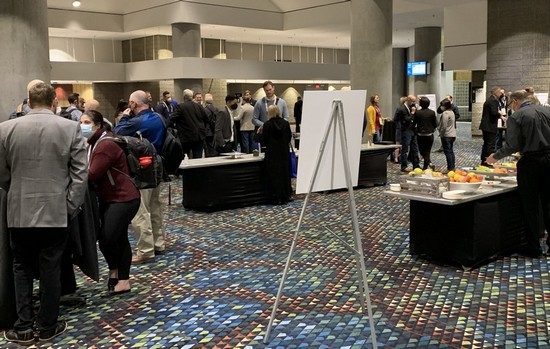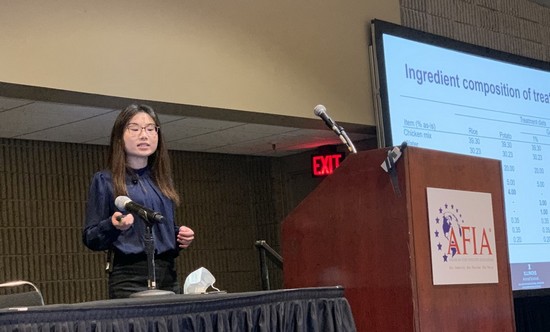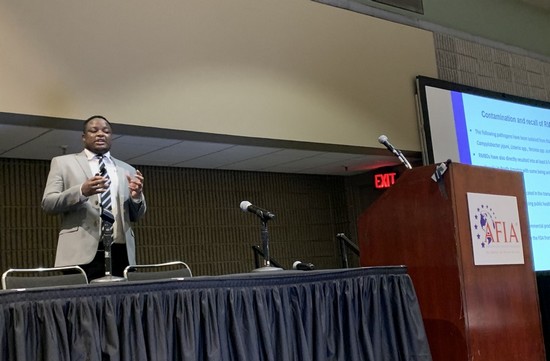After an excellent breakfast, which also served to meet up with old friends and new members of the Pet Food Industry, Ryan Frank, from Mars Pet Care, welcomed everyone present and gave us an overview of what we could expect from the Conference.
The conferences then began with talks by experts from AFIA and the industry, which paved the way for us to enjoy the "Emerging Issues of the Pet Food Industry", topics addressed by graduate students, the new talents of the Industry.

Undoubtedly, the papers and these young graduates called everyone's attention as they addressed very current issues related to new ingredients of plant origin, among other topics of great interest.
Clare Hsu from the University of Illinois was the first to take the scene and focus us in a few seconds on a very suggestive topic "Chemical composition of selected green banana flour and its effects on texture and color in canned foods, apparent total tract digestibility and fecal metabolites of adult cats'.
Green banana flour? We all wondered and put aside what could distract us to focus on Clare Hsu, who undoubtedly had a lot to tell us.As this flour is a functional ingredient, gluten-free, with low levels of sugar, starch and a natural colorant, it would undoubtedly have a great application in pet food.

In her study, Miss Hsu used 40 adult domestic cats and the dietary treatment was based on Rice and Potato Control food with 1,2 and 4 % sustitution of GBF; concluding at the end of the study that green banana flour has a high resistant starch content, which is indigestible and can be a source of fiber.
Mrs. Hsu also concluded that when GBF was used in canned food, it could influence the texture and color and has no difference in nutrient digestibility of fecal characteristics of cats with diets containing GBF compared to Rice and Potato
Undoubtedly this study that will require much more research to be definitively applied, but led us to look at the banana from another perspective within the Pet food industry.
Samuel Kiprotich from Kansas State University then gave a lecture on the Application of encapsulated acidulants to control salmonella enterica in raw meat-based diets for dogs; another topic that caught the attention of the experts, since it addressed as objectives to determin the antimicrobial efficacy of encapsulated lactic acids in controlling of salmonella entérica in raw pet food, as well as to monitor the PH of this type of food.

Finally Powan Sing from the University of Guelph, who could not be physically present, offered her presentation through a video on the Effect of Legumes on Canine Cardiac Function, another innovative research for the Veterinary industry of our pets.
Basically the study focused on the inclusion of 0 to 5% of pulses in dog diets and its effect on their cardiac health. As we all know, legumes have been widely used in pet food for a long time and undoubtedly have a series of conditions to be an alternative protein since it isn´t dietary source of taurine and on the other hand it's a source of total dietary fiber.
However, in this case the analysis of the use of pulses focused on the cardiac health effects of our pets through their different levels of inclusion (from 0-5%) and took into account different types of pulses, peas and chickpeas, lentils and beans used in canine diets, when feeding healthy dogs for 5 months.
As a result of the study she got that feeding healthy dogs grain free, pulse inclusive diets with up to 45% inclusión of green peas, beans and lentils didn´t result in negative repercussions on canine cardiac health, based on the electrocardiograms performed.
All of the above has a lot to do with the use of grain-free diets, with a great boom in recent years, which replaced flour grains by protein of animal origin derived from cow, pork, rabbit, duck and salmon. ; factor that contributes to reduce the appearance of allergies in our pets according to some authors. It´s a high-protein, low-carbohydrate diet, although whether grain-free diet is more healthy or not is still up for debate.
Undoubtedly our industry has new challenges ahead, but our young talents, supported by the expertise of Industry professionals, universities and associations, will seek new ingredients and ideas that meet the different needs of nutrition, sanitation and equipment intended for the pet food industry in a more sustainable way… The future is guaranteed!
by: Iván Marquetti
All Pet Food
You could be interested: Stalk About Nutritious: It’s Corn!


































